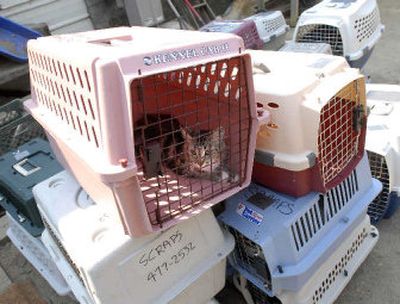Hundreds of cats seized

After an apparent case of cat hoarding, animal welfare groups are working with Bonner County officials to remove more than 400 cats and kittens – many of them ill and dying – from eight dilapidated trailers at a would-be shelter near Blanchard, Idaho.
Authorities who served a search warrant at the Voice of the Animals Camelot Sanctuary on Wednesday found the carcasses of about 40 cats in freezers and said at least two others died during their initial walk-through. The 23-acre shelter is just north of Blanchard at 1031 Stone Road.
“This is probably going to be the largest single animal seizure in Idaho history,” said Dr. Jeff Rosenthal, a veterinarian who is executive director of the Boise-based Idaho Humane Society and was on hand for the seizure.
The animals are being taken to a county-owned warehouse at Priest River, said Gail Mackie of SpokAnimal CARE, which is assisting with the rescue, along with the Spokane County Regional Animal Protection Service and four other animal welfare groups. The Humane Society of the United States is the lead agency in the case, Mackie said.
Cheryl Perkins, 58, and Ed Criswell, 43, who operated the shelter at 1031 Stone Road, are each being charged with a single count of animal cruelty through neglect, said Bonner County Deputy Prosecutor Louis Marshall. The charge is a misdemeanor in Idaho.
Humane Society officials decried the lack of a felony animal cruelty charge in Idaho, saying it’s possible the pair could now move to a different state and start up another operation. A felony conviction becomes part of a permanent record, and can be more easily tracked by authorities, whereas a misdemeanor does not, said Inga Gibson, program manager for the Humane Society of the United States.
Gibson said she would request that any sentence require mandatory psychological counseling and prohibit Perkins and Criswell from owning animals
The Bonner County Sheriff’s Office on Wednesday served the search warrant at the shelter, which lacks a permit. Bonner County officials said in February that the shelter violated zoning regulations, and that they wanted it shut down.
Authorities on Wednesday also found dogs, goats and chickens, generally in better condition than the cats, said Bonner County Sheriff’s Capt. Jim Drake.
The stench of cat urine and feces was overpowering in the living area of the double-wide trailer where Perkins and Criswell lived. Cat urine, diarrhea and feces covered many surfaces of the trailer, including beds, kitchen counters and flooring. Dogs sitting on worn-out couches in the living room constantly snapped at flies and fleas, and fly trap strips hanging from the ceiling were covered in dead insects.
“Unsanitary would be an understatement,” Rosenthal said, adding that conditions were similar in the other seven trailers, which were used to house the cats.
Perkins and Criswell may have had a strong desire to care for animals, Rosenthal said, but they had nothing else: no resources, no staff and no training. Rosenthal said the Idaho Humane Society, with a staff of 65, only has room for 100 cats at any time.
“They did nothing but create an even worse situation,” he said.
Rosenthal said the symptoms on site were typical of a “classic hoarding personality,” which he and other Humane Society officials said is a mental illness. He said the growth in “no-kill” facilities — those that do not euthanize animals — has led to more hoarding behavior because more unwanted animals need homes.
Rosenthal said the situation on Stone Road “would have overwhelmed any law enforcement agency in the state.”
Workers on site were methodically capturing cats and delivering them to veterinarians, who were examining them to determine whether they could be saved. Many of the cats were infected with ringworm, among other health problems, Rosenthal said. They are “universally parasitized,” he said.
There’s no telling how many of the 200 cats already examined by midday Thursday will survive, he said.
“I don’t think we’ll ever know how many cats died on a daily or weekly basis” at the shelter, Rosenthal said.
A letter from the sanctuary’s owners to the county planning department on Aug. 30 led to Wednesday’s search, Marshall said. Criswell and Perkins wrote that “conditions had become substandard to the point animals were dying.” The letter indicated that the property was being foreclosed on and “they had no idea what they were going to do with the animals,” Marshall said.
The Associated Press reported in 2004 that many of the animals at Voice of the Animals were sick with a strain of diphtheria, and the sanctuary director was quoted saying that one to four cats were dying every day.
“We’re doing rescues that nobody else is willing to do,” said Perkins, the sanctuary’s chief executive officer. “We get the worst of the worst. And we know it’s not much, but we’re trying to give the cats a good home and to save animals.”
Sanctuary director Criswell said at the time that Voice of the Animals took elderly cats that were considered un-adoptable by shelters, and had a special unit for cats with leukemia. The animals were treated with holistic health products, he said, and fed with 2,500 pounds of donated dry cat food a month.
Criswell said in 2004 that only three cats had been adopted from the sanctuary in the previous three years.
Cats from the sanctuary will be distributed to humane societies throughout the region — wherever there’s room, said veterinarian Tami McReynolds, executive director of the Lewis Clark Animal Shelter in Lewiston, who was on hand to help this week.
McReynolds said when people decide to give a pet away, it is their responsibility to make sure it goes to a reputable organization.